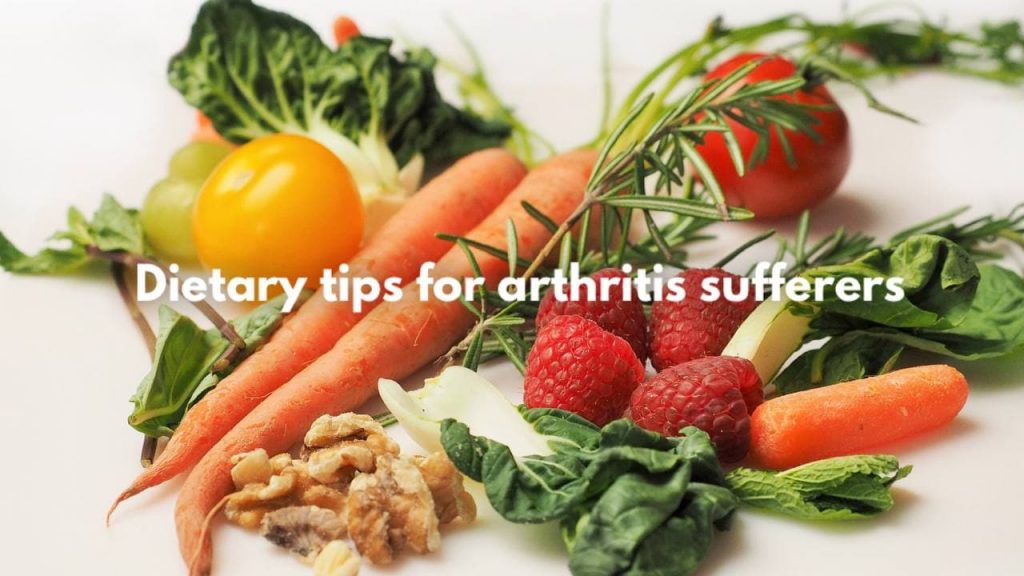With over 1 million orders

ADVISE FROM DR. ARTHRITIS: DIETARY TIPS AND RECOMMENDED FOODS FOR ARTHRITIS
If you browse the internet you will find a million different diet tips and recommended foods for arthritis. However, there are a few points to stress when reading this content. Firstly, there is no dietary miracle cure. There is no single diet that will cure your arthritis. Secondly, you don’t necessarily have to eat foods you don’t enjoy to manage your condition. Third, diet does play a very important role in the management of arthritis, but at the end of the day, a balanced, nutritious program is your best bet.
Take note of the following guidelines below–
When it comes to vitamins & minerals
Of course, many vitamins and minerals are essential in ensuring good health but the following are particularly important in arthritis:
Calcium
Calcium is an essential mineral with 99% of body calcium in bones and teeth. An adequate calcium intake decreases your risk of osteoporosis and also osteomalacia (if you are suffering from an autoimmune arthritis and you are taking steroids regularly, you have an increased chance of developing this condition).
Food sources: Milk, dark leafy vegetables (e.g. spinach), soybeans, cheese, almonds, yogurt, fish, okra.
Vitamin D
Vitamin D facilitates your ability to absorb and use calcium. Vitamin D has been nicknamed the ‘sunshine vitamin’ as your body can process it when your skin is exposed to the sun. It is important to ensure that you have some sun exposure. However, you should also bear in mind that excessive sun exposure can be detrimental to your health. Vitamin D deficiency is quite common especially amongst those with darker skin who live in a climate where there is little sunshine. Symptoms include bone pain and fatigue which can be confused with arthritis. It may be useful to test your Vitamin D levels as a deficiency can often be rectified through taking supplements.
Food sources: mushrooms, milk, eggs, oily fish, fortified cereal, tofu, orange juice.
Iron
A deficiency in iron results in anaemia and you may experience symptoms such as fatigue, shortness of breath, headaches and dizziness. You are more likely to suffer from anaemia when you have arthritis. There are two possible reasons for this. Some of the medications (NSAIDs – e.g. ibuprofen) may adversely affect the lining of your stomach (speak to your doctors if you feel worried about this or taking these medications for prolonged periods as your doctor may wish to prescribe other medications in conjunction which help protect your stomach lining). Furthermore, with rheumatoid arthritis you may suffer from anaemia of chronic disease.
Food sources: red meat, seafood, beans, dark leafy vegetables, dried fruit, lentils, tofu, quinoa.
Vitamin C
This is a bit of a tricky one. One study (in animals) had suggested that very high levels of Vitamin C accelerated joint damage in osteoarthritis. Another study suggested those with low levels of Vitamin C were more likely to develop rheumatoid arthritis. It is therefore important to get the right balance of Vitamin C – not too little, nor an excess.
Food sources: citrus fruits, kale, red peppers, Brussel sprouts, broccoli, guava, papaya, chives, thyme, basil, parsley.
Selenium
Selenium deficiency is reasonable common. Research suggests that selenium deficiency may accelerate arthritis progression. Again, however, excess selenium intake may be harmful.
Food sources: Brazil nuts, yellowfin tuna, halibut, sardines, beef liver, chicken.
Dr. Arthritis’s Top Food Tips
1) Sardines, mackerel and salmon
These food sources are rich in omega 3 fatty acids which can help reduce inflammation. Aim for two portions a week.
2) Broccoli
Research in animals has suggested that broccoli may serve to prevent or slow progression of osteoarthritis. If you’re not a fan try it in a soup!
3) Ginger & Turmeric
Eastern medicine has been using ginger and turmeric supplements to treat arthritis for many years. Evidence is emerging that they do in fact have anti-inflammatory properties.
4) Green tea
Green teach is rich in anti-oxidants and other nutrients. Furthermore it reduces inflammation. Bear in mind tea bags are more natural than the powdered tea mixes.
5) Cut down on processed food
Cutting back on this can have many positive effects on your health. Processed foods such as fried meat, frozen/microwavable meals can increase inflammation. Often they are high in salt which may worsen any inflammation.
6) Reduce your AGE
I’m not talking about getting younger here (although that would be nice!). AGE stands for advanced glycation end product and is a toxin produced in heated, grilled pasteurised or fried foods. AGEs damage other proteins in the body and may contribute to arthritis.
7) Dark chocolate
We’ve saved the best for last! Chocolate with a cocoa content of greater than 60% is full of anti-oxidants and again has anti-inflammatory properties. Don’t overdo it as chocolate is still high in sugar and saturated fats.
